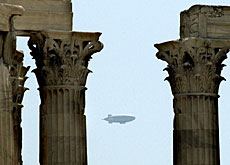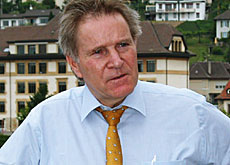Former Olympic head sees Switzerland slipping

The 28th Olympic Games of the modern era have come to an end in the Greek capital, Athens.
In an interview with swissinfo, former International Olympic Committee (IOC) director-general François Carrard says Switzerland needs to try harder – and not just in sport.
Swiss-born Carrard was IOC director-general for 14 years and worked alongside IOC presidents Juan Antonio Samaranch and Jacques Rogge.
But the 66-year-old has since given up his position at the Lausanne-based IOC to another Swiss, Urs Lacotte.
He now heads his own legal firm and continues to work as a legal adviser to the IOC.
Carrard was in Greece for the duration of the Games, in the place where they were born and re-invented in 1896.
Amid high security, the city of Athens put on its best face for the rest of the world. Carrard turns a critical eye on the events of the past two weeks.
swissinfo: How do you assess the tally of five medals – one gold, one silver and three bronze – won by the Swiss in Athens?
François Carrard: I am trying to be positive. In my view, the results in some way reflect Switzerland’s position in society and in the world. The country is lagging behind a little, even if it is making a lot of effort.
You have to admit that the world in which we live is moving forwards… and is doing so better and faster than us. And I think we need be aware that this does not apply only to sport.
For me, one thing is clear. More has to be invested in terms of human resources and money in Swiss sport. Efforts are being made but they are taking time. I am in favour of a professional approach to the training of athletes. But to do away totally with volunteers would be a huge mistake.
swissinfo: What memories will you take away from Athens 2004?
F.C.: The return of the Games to Greece was magnificent and I am happy for the Greeks and for the Olympic movement because it was very important. Here, the understanding of and interest in [the Olympics] was really special and the magic seems to have worked.
The Greeks also surprised those who feared the worst after all the difficulties that were experienced from the beginning. I think it is important to note the extraordinary quality of all those who made these Games.
Greece is an intelligent nation and its people have shown flexibility, quick-wittedness and a very great ability to adapt. They always managed to find clear-sighted solutions to the problems that came up.
swissinfo: Did the Athens Games manage to avoid becoming too vast?
F.C.: Athens has managed to profit from this Olympiad. It used to be a chaotic city. The holding of the Olympic Games allowed it to make huge advances in terms of infrastructure, transport and the hotel industry.
It is a city, also architecturally, which will find a new place for itself on the world atlas in the years to come.
However, the question of the use of some of the facilities after the Olympic Games is not very clear. I am not sure that the Greeks have succeeded in planning totally what exactly will happen after the event. The fault may be in their way of finishing things at the last minute. There is a risk of maintenance problems here and there but it is difficult to evaluate all this for the time being.
swissinfo: More than 20 athletes tested positive for banned substances, a record for the Olympic Games. What do you have to say about this?
F.C.: The Athens Games represent a real turning point in the fight against doping. We have moved from a time when we tried to identify the problem… to a time in which the search for those who cheat has become really intense.
Every case of doping that is discovered and ruled on by the authorities is a new victory in this difficult battle. Personally, I have noticed a significant cultural change in the way people understand doping. Not only on the part of the public, but also – and this stems from the hearings I have attended – on the part of the athletes and the people around them. I feel there is a general desire to make further progress.
swissinfo: The 2004 Games have been marked by the tightest security in Olympic history. Did this interfere with the competition?
F.C.: I never had any doubts about the Greeks when it came to security. Countries that are permanently faced with security concerns have learned to manage this unknown. And in the end, despite the large number of security people, the constraints were no worse than in the past.
swissinfo: Are any new sports likely to make an appearance at the 2008 Olympic Games in Beijing?
F.C.: The Olympic Programme Commission is looking into this question. But there will be no additional disciplines in Beijing because the limit of 10,500 athletes cannot be exceeded.
The Olympic programme is like a packed bus. If you want to let a new passenger on board, someone else has to leave. And if certain sports are struck from the list, it would spell the end for them.
But I’m confident that IOC president Jacques Rogge will make the right decisions. The debriefing after the Athens Olympics – which is expected to take place between now and a meeting in Singapore next year – should shed some light on the issue.
swissinfo-interview: Mathias Froidevaux
François Carrard was born in Lausanne on January 19, 1938.
A doctor of law, he was IOC director-general from 1988 to 2002.
He is now the main legal adviser to the IOC.
Carrard is also president of the Montreux Jazz Festival.
The 66-year-old François Carrard works at his legal firm in Lausanne with a staff of more than 30 people.
His mandate as legal adviser to IOC president Jacques Rogge includes remodelling the Olympic charter, negotiation of television rights and representing the IOC at the Court of Arbitration for Sport.
The Athens Olympics, which Carrard has attended throughout, were the first since he retired as IOC director-general.

In compliance with the JTI standards
More: SWI swissinfo.ch certified by the Journalism Trust Initiative












You can find an overview of ongoing debates with our journalists here . Please join us!
If you want to start a conversation about a topic raised in this article or want to report factual errors, email us at english@swissinfo.ch.